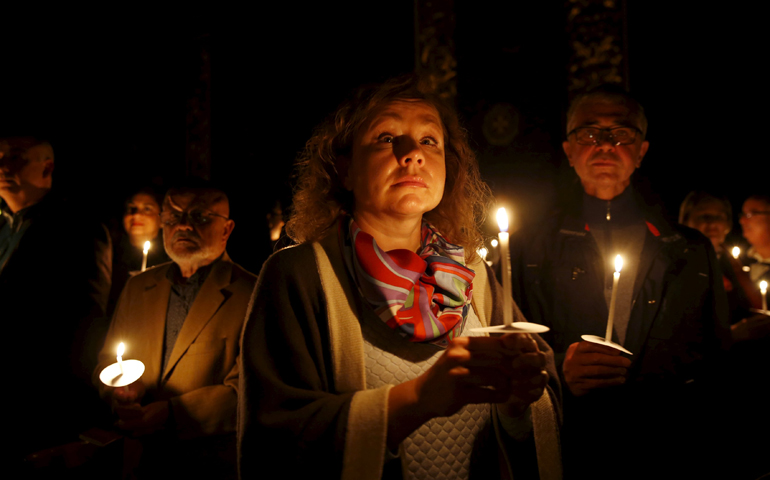
Worshippers hold candles during the Easter Vigil at St John's Co-Cathedral in Valletta, Malta, March 26, 2016. (CNS/Darrin Zammit Lupi, Reuters)
Columnist's note: As I was mulling over what to write this week, my friend and housemate, St. Joseph Sr. Jeanne Cmolik, preached a wonderful reflection on Palm Sunday. It was too good not to share. Thanks Jeanne, for graciously agreeing to be my "guest columnist" for this month's Simply Spirit! — Christine Schenk
As we gather during this Holy Week and Easter season to recall Jesus' journey to death and resurrection, we reflect once again on the meaning of discipleship. In these troubled days of 2017, I want to talk about one aspect of discipleship: following Jesus as prophet.
Matthew tells us, "When Jesus entered Jerusalem the whole city was shaken and asked, 'Who is this?' And the crowds replied, 'This is Jesus the prophet, from Nazareth in Galilee'" (Mt 21:10-11).
A prophet is one who interprets the signs of the times and bears witness to God and God's reign. Old Testament scholar, Walter Brueggemann, says that prophetic witness calls us to pierce the numbness and energize hope.
Certainly, we can see Jesus the prophet "piercing the numbness" and "energizing hope" in his years of public ministry among the common folk of his time. He was one of them. On the one hand, that helped him understand their predicament, but on the other, they found it difficult to believe that he spoke with such authority.
To those who did believe him, he brought a message of a loving God, an assurance of each person's dignity and inner goodness, and the consolation of God's light shining in the darkness of their lives.
This did not sit well with the Roman officials and the religious leaders, who feared that such a message of hope could upset the domination system that was in place in those days. Jesus used some pretty strong words against the leaders, telling them the domination system would be overturned; charging that they were blind and would not get into the Kingdom, that tax collectors and prostitutes would.
In their book, The Last Week, Scripture scholars Marcus Borg and John Dominic Crossan write that "Jesus's passion [for the Kingdom] caused his passion [and death]."
Jesus' passion caused his Passion.
We live in interesting times. After a tumultuous presidential campaign and election, we continue to experience deep unrest in our country.
While we can say that the events of the past year have awakened us from our complacency, we know there is still much numbness in our country — either because we take all that we have for granted or because we have given up hope that things can be different.
Right around the time of the national election last November, I ran into one of my former students. He told me, "I haven't voted in 25 years and won't vote this time either. Don't make any difference so why bother? I just stay out of it."
I could see his numbness, and it made me sad. But I know I have numbness to confront of my own. I think mine is caused more by pain than by indifference. First I was unbelieving, then I was angry, then I felt helpless, then I wanted to run and hide (or at least stop listening to the news).
But I call myself a disciple of Jesus the Christ, who came as light to all who walk in darkness.
How do we help one another to pierce the numbness and get involved? How do we encourage one another to dream new dreams — and offer hope — for a different world?
St. Paul reminds us that we are "children of the light" (1 Thes 5) and the letter to the Hebrews says we are "surrounded by a cloud of witnesses" (Heb 12:1). We must pay attention.
Our sisters and associates work with immigrants, with victims of trafficking, and with those who struggle with poverty. They minister in our name and their fidelity helps to pierce the numbness and bring hope to our world. But each of us is also called to pierce the numbness and energize those around us with hope.
In dark times, it is easy to sink into quiet despair, because we feel small and insignificant and the problems of the world loom large — way beyond our reach.
Clarissa Pinkola Estés, American poet and Jungian analyst, reminds us in an essay that "ours is not the task of fixing the entire world all at once, but of stretching out to mend the part of the world that is within our reach. Any small, calm thing that one soul can do to help another soul … will help immensely."
Related: Dear brave souls … do not lose heart (May 5, 2008)
By mindful, loving attention to the "dear neighbor," we bring hope to the world. With our eyes open, we learn to stand together in love, and to speak in love. Estés says, "Struggling souls catch light from other souls who are fully lit, and willing to show it."
Perhaps this is what St. Paul means when he encourages us to "walk in the light"— to walk in each other's light.
When we stand together to call attention to the plight of immigrants trying to enter our country, or to insist on the need to address climate change, we say to one another, "Come, walk in my light," or maybe "I need to walk in your light."
Jesus welcomed everyone — rich and poor — to table fellowship. We gather at table this week to celebrate the God-Man who pierced the numbness and energized his people with hope.
And we ask for the grace to live and die as he did.
[Jeanne Cmolik is a Sister of St. Joseph.]
Editor's note: We can send you an email alert every time Christine Schenk's column, Simply Spirit, is posted. Go to this page and follow directions: Email alert sign-up.



